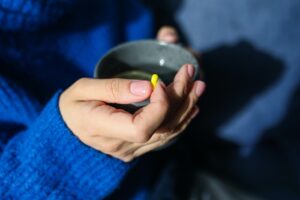Drug & Alcohol Rehab Birmingham
Birmingham is a beautiful city and the second largest in the United Kingdom and is considered to be the cultural and financial centre of the Midlands. However, Birmingham is no stranger to drug and alcohol-related concerns.
A study in 2018 estimated that over 13,000 adults in Birmingham alone struggle with alcohol dependency, a rate of nearly two people in every 100.
Similarly, in 2017, it was estimated that around 10,000 adults used opiates or cocaine, making up over 3% of the UK’s total.
We are OK Rehab, a recovery-advocate service that strives to support anyone and everyone who is struggling to cope with addiction and help them self-refer to suitable rehab treatment.
With our help, you could undergo drug or alcohol detox treatment and recovery in a Birmingham-based rehab centre and be on track to a full recovery in no time.
We’re ready to help you find support for a wide range of addictions, including:
- Binge drinking and alcoholism treatment
- Benzodiazepine addiction treatment
- Buprenorphine addiction treatment
- Cannabis addiction treatment
- Cocaine rehab and crack cocaine addiction treatment
- Ketamine addiction treatment
- Heroin addiction rehab and other forms of opiate addiction and opioid use disorder treatment
- Crystal meth and other amphetamine addiction treatment
- Prescription drug addiction treatment
- Ecstasy rehab
- Treatment for behavioural addictions such as gambling addiction, shopping addiction, sex addiction, porn addiction and eating disorder treatment
We understand that at this time, you may have many questions about the possibility of recovery through a drug & alcohol rehab clinic in Birmingham and queries about addiction.
Some of our most frequently asked questions are answered briefly below but do not hesitate to get in contact with us if you do not find the information you are looking for here.
Please call our 24-Hour Helpline: 0800 326 5559
What is addiction?

An addiction is defined simply as an individual compulsively partaking in certain behaviour that offers some incentive, despite the known consequences.
When addiction is mentioned, many will automatically think of substances like drugs, nicotine, and alcohol, but these aren’t the only things a person can be addicted to. It is possible to be addicted to just about anything.
Shopping, collecting, sex, exercise, gambling, and working are all things that an individual can become addicted to.
The main connection between all addictions is the constant chase for a ‘high’. With addictions like shopping or collecting, this high is the purchase of a new item; with gambling, it can be the feeling of winning, and this formula applies to all forms of addiction.
When it comes to drugs and alcohol, this high is a literal one. As substances like these are consumed, they work to alter the ways our cells normally send, receive, and process information.
They do this by over-stimulating the ‘reward circuit’ of our brain and flooding it with excess chemicals.
This can make the user feel less stressed, relaxed, and happy. This feeling and the break it gives the individual from daily life is what drugs and alcohol offered in the form of a high.
No matter what behaviour or substance you are addicted to, we will be able to help you find the right support for you in Birmingham.
Please call our 24-Hour Helpline: 0800 326 5559
What causes drug & alcohol addiction?

The majority of addictions are caused by the misuse of the above-mentioned ‘high’ that comes with drugs and alcohol.
For some people, this high can be reached regularly with no addiction-forming, as they may use substances in small amounts, usually purely for recreational purposes.
However, addiction is sure to form when this high is used as a coping technique to avoid difficult emotions, events or even people.
A continuous drug or alcohol intake to cope with any number of triggers (which could be anything such as stress from work, dysfunctional families, abusive partners or past trauma) can lead to the user experiencing an increase in their tolerance for the substance each time they take it.
This can, in turn, lead to them needing to increase their drug or alcohol intake each time they use it to reach the same desired effect. This is where addiction can spiral out of control very quickly.
It is important to act quickly and reach out to addiction recovery services in Birmingham.
Addiction can affect every part of your life when it begins to spiral out of control. At alcohol & drug rehab clinics in Birmingham, the resident team will address each part of why you began to abuse the substances and what the consequences have been.
Please call our 24-Hour Helpline: 0800 326 5559
How do I know if I am addicted to drugs or alcohol?

While it can be incredibly obvious to others, knowing if you suffer from addiction can very often be difficult to identify and acknowledge.
Denial, misinformation, and ego can all contribute to this, but knowing you need help is something a lot of people struggle with.
In order to help those who need support, it is important to give individuals techniques and methods for noticing their own unhealthy behaviour, and one of these is the CAGE questionnaire.
With this, individuals need to ask themselves the following four questions:
- Have I ever thought I needed to cut down on my substance use?
- Have I ever been annoyed by someone – possibly a friend or family member – commenting on my substance use?
- Have I ever felt guilty about my rate of substance use?
- Have I ever used substance use as a way to wake myself up or as an ‘eye-opener’?
The CAGE questionnaire identifies several key aspects of unhealthy substance use that individuals might not notice by themselves. If they answer ‘yes’ to any of the questions, they will likely need some addiction support or treatment.
It is important to remember that only a trained professional can properly diagnose you with addiction. If you want to be formally diagnosed, please contact our team, and we can help you arrange it in Birmingham.
However, the CAGE questionnaire is useful for giving an indication of the severity of an individual’s addiction.
Several other forms of accessible addiction assessments also exist and may be used by medical professionals to determine both the existence and severity of an addiction, as well as help them form a comprehensive rehab treatment plan.
These include:
- The Alcohol Use Disorders Identification Test (AUDIT)
- The Diagnostic and Statistical Manual of Mental Disorders criteria (DSM-5)
- The American Society of Addiction Medicine criteria (ASAM)
Please call our 24-Hour Helpline: 0800 326 5559
When should I seek professional help at an addiction treatment programme?

You should seek professional help for addiction as soon as you notice the signs of one creeping into your life.
It may be hard at first to realise what it is you are experiencing, so listen to friends and family members if they express concern over your use of substances, and try to notice how your substance use has impacted other aspects of your life.
Have you lost weight suddenly? Are you struggling to sleep? Are you more withdrawn in your social life, or are you avoiding responsibilities at your job?
Suppose it becomes clear that your use of drugs and alcohol is no longer recreational, and you are using them to regularly cope with negative and difficult emotions.
In that case, it is time to get in contact with a professional.
When you enquire with us here at OK Rehab, we can take you through the signs and symptoms of addiction step by step and discuss which ones you may be experiencing. Then we can discuss your rehab treatment options in Birmingham.
We can help identify what you are suffering from and narrow down how best to help your situation. However, for us to be able to do so, you have to first pick up the phone and contact our team.
Please call our 24-Hour Helpline: 0800 326 5559
How can I help a loved one experiencing alcohol or drug addiction?

It can be scary to know and love someone who is struggling with a drug or alcohol addiction, especially when they are refusing to acknowledge its existence.
We recommend not attempting to interfere with your loved one yourself, as this – when done improperly – usually leads to disputes and disagreements and can result in the individual sometimes falling even further into drug and alcohol abuse in retaliation.
Instead, we suggest reaching out to us here at OK Rehab. We offer access to professional intervention services that can help your loved one come to terms with their addiction and begin to consider seeking the help they need in Birmingham or further afield.
These addiction treatment specialists can guide conversation during the intervention, providing insight and specialist knowledge, as well as addiction education for the friends and family of the sufferer to help them better understand their situation.
Many intervention specialists have experienced addiction themselves in the past and are now living in recovery, making them the best possible people to support your loved ones and help them to realise the severity of their situation.
Please call our 24-Hour Helpline: 0800 326 5559
Pre-rehab steps: Intervention in Birmingham

Many misunderstand addiction because individuals rarely notice how destructive their behaviour is.
Denial is a common, even central component of being addicted, and so it is often family members and friends who kickstart the recovery process.
The most common way that this is done is through interventions. These are events where an individual’s closest family and friends come together to bring their attention to their addiction problems and offer them support, love, and encouragement regarding getting rehab treatment.
These events depend a lot on trust, and the discussion about the individual’s behaviour must often be very intimate and delicate.
Each attendee is encouraged to speak, offering their own experiences, views, and support.
Interventions, of course, can be difficult to arrange. But, to help families put them together, there are professional interventionists who can lend crucial guidance in the arrangement and execution of effective events.
If you are looking to employ the services of a professional interventionist in Birmingham, please contact our team at OK Rehab.
Please call our 24-Hour Helpline: 0800 326 5559
The CRAFT approach to intervention in Birmingham

Interventions are incredible tools for getting individuals the treatment and support they need. Family members do not, however, have to necessarily take the conventional route of a single event or coming together of loved ones to kickstart the recovery process.
Alternatively, there is the CRAFT approach to intervention. This style goes beyond a single event and instead involves family and friends working together in order to encourage individuals out of their negative behaviour patterns and into healthier ones.
Addictions develop because the brain forms an association between taking drugs or drinking alcohol and sensations of pleasure or happiness.
To combat this, CRAFT involves an individual’s loved ones trying to make the brain work differently.
They do this by rewarding healthy behaviour – such as attending rehab practices or abstaining from substance use – with treats and positive affirmation and punishing negative. This usually involves leaving individuals to experience the consequences of their substance use.
By doing this and being consistent with it, family and friends work to help an individual see the benefits of sobriety – forming a new association in their brain – and encourage them to practice a healthier way of living.
Please call our 24-Hour Helpline: 0800 326 5559
How much does an alcohol & drug rehab clinic cost in Birmingham?

The options for drug & alcohol rehab Birmingham are diverse, and this means that there are many different prices that individuals can pay for their rehab treatment.
On average, a private inpatient rehab programme in Birmingham will cost around £495 a day. For a total of 28 days of rehab, this price adds up to around £14,000.
The range in prices that these facilities can charge swings on both sides of this average. A more simplistic, cost-effective addiction treatment programme can be as little as £1,000 to £10,000 a week, whereas their luxurious counterparts can charge in excess of £70,000 for 28 days.
Please call our 24-Hour Helpline: 0800 326 5559
Is drug and alcohol rehab covered by health insurance?

When beginning the addiction recovery process in Birmingham, individuals have to confront a very important factor in determining what route they take, and that is their budget.
Paying for rehab treatment is going to have a huge impact on what options an individual has, and this consideration often sparks them to want to know if they are entitled to any support from their health insurance provider.
In each specific case, an individual will need to assess any coverages they have and look at what treatments are included. It is becoming increasingly common for mental health treatments and addiction support to be covered by health insurance, so this might be a source of support.
Please call our 24-Hour Helpline: 0800 326 5559
Is drug & alcohol rehab treatment on the NHS?

Individuals living in the UK are very lucky to be supported by the NHS, a nationwide organisation that provides healthcare and medical services without charging them anything for it.
This fact can often lead those struggling with addiction to drugs or alcohol to wonder if their rehab and further treatment are at all covered by the NHS.
The answer is that the NHS does provide addiction treatment services for those looking to tackle their addiction problems, but these services are very limited in Birmingham and around the country.
NHS addiction treatments function with limited resources, while a more luxurious addiction treatment programme are offered by private companies.
For more information on what addiction treatment services the NHS does offer in your area, it can help to look on the NHS website or reach out to your GP.
Free addiction treatment services available in Birmingham include:
1. Turning Point Birmingham
Address: Dale House, New Meeting Street, Birmingham, B4 7UG
Telephone: 0121 665 4030
Website: https://www.turning-point.co.uk
2. Forward Thinking Birmingham
Address: 60 Queensbridge Road, Moseley, Birmingham, B13 8QE
Telephone: 0121 333 9955
Website: https://forwardthinkingbirmingham.nhs.uk/substance-misuse
3. Change Grow Live Birmingham
Address: 255 Hospital St, Birmingham, B19 2YF
Telephone: 0121 227 5890
Website: https://www.changegrowlive.org/drug-and-alcohol-service-birmingham?birmingham=
4. Aquarius
Address: 236 Bristol Road, Edgbaston, Birmingham, B5 7SL
Telephone: 0121 622 8181
Website: https://aquarius.org.uk/
Please call our 24-Hour Helpline: 0800 326 5559
How long does a rehab programme in Birmingham last?

The average amount of time for a rehabilitation programme in an alcohol & drug rehabilitation clinic in Birmingham is around 28 days.
With this being said, all rehab clients are different, and every addiction is too. This means that this allotted 28 days may not always be right for every client, and some will need considerably longer in rehab, whereas others may be able to leave before this time.
If you are someone who requires longer than the expected 28-day period, do not worry.
It is normal and expected for all rehab clients to need varying lengths of time due to the varied set of rehab treatments that each client will receive.
The amount of time you need at a drug & alcohol rehab clinic is also decided by other factors that are now out of your control, such as the substances you have used in the past.
We suggest focusing not on the ‘finish line’ but on the progress you are sure to make along the way.
Doing this, and being able to look back on your improvement and see real changes, can spur you on to continue with your recovery, rather than make you feel like the process is taking too long to provide you with tangible results.
Your recovery is still possible no matter the length of time you spend in rehab.
Please call our 24-Hour Helpline: 0800 326 5559
NHS vs private addiction treatment services in Birmingham

Addiction recovery services for drug and alcohol rehab Birmingham comprise lots of different kinds of treatment programmes and facilities. Within this catalogue of options, there are rehabs provided by both the NHS and private companies, and these each have their own benefits.
Choosing which of these options to take up at the beginning of the treatment process is a big decision. The appropriateness of either will depend on the details of an individual’s situation and so assessing each for its positives and negatives is really useful.
Please call our 24-Hour Helpline: 0800 326 5559
NHS addiction treatment and other free drug and alcohol rehab services

Budgetary considerations are very important when it comes to selecting treatment. Not everyone can afford to spend a lot on their recovery, and NHS addiction treatment is advantageous in this sense because treatment costs little, often nothing at all.
In addition to this sense of accessibility in terms of finances, many different types of addiction treatment programmes can be found in abundance all around the UK.
In Birmingham, these facilities will be located in a variety of locations, suitable for anyone regardless of their ability to travel or relocate.
Where the NHS programmes falter, however, is in the quality and depth of the treatment they are able to provide.
That is not to say that the staff at these facilities are less qualified, but that the spreading of public addiction recovery services across the UK means that each facility functions with the bare minimum of staff, equipment, and resources that it requires.
This fact means that individuals often receive uniform, impersonal care, and those waiting to receive treatment might have to wait weeks or even months while an NHS facility works through those currently enrolled.
Please call our 24-Hour Helpline: 0800 326 5559
Private addiction treatment in Birmingham

For some individuals, rehab isn’t only a functional, goal-oriented process. They can also see it as something that they want to enjoy, a process they want to fully embrace as it changes their life. For this kind of individual, private care is much more appropriate.
Private rehab programmes in Birmingham excel when it comes to individual experience. They are often more comfort-focused, providing a range of activities and facilities that help individuals feel happy and safe during their treatment.
This often means they provide sporting classes, spa treatments, and other recreational activities, as well as the fundamental methods of addiction rehab in Birmingham.
In addition to exceptional facilities, these programmes also employ top talent in the field of addiction recovery and rehab. This is largely due to the wages that they can offer, enabling them to attract experienced professionals.
Accessibility, however, is the problem with many private rehab programmes in Birmingham. Not only are the prices often too high for those struggling with addiction to drugs or alcohol to afford, but the expansive range of facilities also means they are not located in every town or city in the country.
In order to fit in sporting, spa, and addiction equipment and facilities, as well as luxurious accommodation, these centres need a lot of space to work with. This will mean leaving the city of Birmingham for the countryside.
They, therefore, can’t be found everywhere, and so people will often need to relocate in order to enrol on them. However, it is a good idea to find the rehab facility which is ideal for you, whether it is Birmingham or further afield.
Please call our 24-Hour Helpline: 0800 326 5559
Inpatient or outpatient drug & alcohol addiction treatment in Birmingham – Which is better?

The start of the treatment process is so important because it is where an individual decides what path they want to take in terms of the kind of addiction treatment programme they enrol on.
There are several choices to be made at this stage of the recovery journey, but few are more important than the choice between an inpatient treatment programme and an outpatient treatment programme in Birmingham.
There are advantages and disadvantages to both of these options, but each needs to be assessed for its suitability. Because if you are planning to admit yourself into an addiction facility in Birmingham, it is important to find the right one for you.
Please call our 24-Hour Helpline: 0800 326 5559
Inpatient treatment in Birmingham

With this option, individuals enrol on an addiction treatment programme and stay within a rehab facility while they undergo their addiction treatment. They get accommodation, receive meals, and have around-the-clock care and supervision.
First and foremost, this treatment option is most appropriate for those with severe or well-developed conditions.
The support and supervision it provides are unmatched, and those who are heavily addicted will need this in order to safely complete addiction treatment in a rehab clinic in Birmingham.
In addition to this level of attention, individuals who take up inpatient care also benefit from the sense of separation that it provides them.
Beating addiction takes dedication and attention, and this is made a lot easier when the distractions and temptations of everyday life are eliminated.
With this structure and focus, however, comes the obvious restriction that individuals will not have the freedom and choice that they usually exercise. They will only be permitted to leave when treatment is completed, and this can be both restrictive and irritating.
Please call our 24-Hour Helpline: 0800 326 5559
Outpatient treatment in Birmingham

Alternatively, outpatient treatment in Birmingham can be seen as the opposite of an inpatient treatment programme in many ways. Instead of staying in an addiction facility, individuals attend addiction treatment sessions while living at home.
The obvious advantage of outpatient treatment is the flexibility that it provides.
Part of why so many people delay getting help for substance abuse problems is that they know it will impact their home and work life, but this kind of care works around those things.
Outpatient rehab treatment is flexible in other ways too.
Programmes like these tend to be less structured, meaning that an individual and their addiction treatment specialist can work towards whatever goals and timelines they both think are appropriate.
Addiction therapy sessions can focus on problems that are most pressing at the given time, and guidance can be tailored to be as effective for people at each different appointment, providing immediate and relevant support to individuals as they progress through their rehab programme.
What outpatient programmes provide in flexibility, however, they lack in the thoroughness of treatment. The lack of constant supervision means they can only provide advice and guidance, and so those requiring detox treatment and addiction treatment therapies require more structured treatment in Birmingham.
Please call our 24-Hour Helpline: 0800 326 5559
Alcohol detox & alcohol rehabilitation in Birmingham

Alcohol & drug rehab in Birmingham takes substance abuse issues incredibly seriously. When it comes to alcoholism – one of the most severe dependencies, an individual can develop – this care and attention are paramount.
Alcohol is a substance taken as part of everyday life, but frequent and excessive consumption can trigger very serious and dangerous addiction. This is because it alters the body’s chemical make-up, making it vulnerable to imbalance when alcohol isn’t available.
When an addicted individual stops taking alcohol, they experience alcohol withdrawal symptoms. Many kinds of substance abuse can cause these, but alcohol is known for its particularly lethal symptoms.
These can include cardiac problems, insomnia, mood swings, and Delirium Tremens (a condition capable of causing sudden death).
Alcohol rehabilitation services, therefore, need to be a carefully planned and executed.
In Birmingham, facilities go about this by forming an addiction treatment plan into two main stages.
Please call our 24-Hour Helpline: 0800 326 5559
Alcohol detox & alcohol withdrawal in Birmingham
Firstly, individuals will go through a 10-day detox programme. This involves them quitting their alcohol intake under the supervision of medical professionals. The role of this medical supervision is essential.
Detox treatment will cause the body to react aggressively, and so doctors need to be on hand to ensure that individuals do not come to harm, or subject others to it, while they become used to sobriety in a rehab facility in Birmingham.
Additionally, these professionals can make the process less demanding on individuals’ physical and mental well-being through the provision of benzodiazepines. These are drugs that dampen the effects of alcohol withdrawal and make individuals more comfortable.
Please call our 24-Hour Helpline: 0800 326 5559
Alcohol therapy

Following on from detox, individuals are then supported in tackling the underlying roots of their dependency on alcohol. While detox is essential, physical sobriety is useless if individuals are compelled to return to drinking once they leave their rehab clinic in Birmingham.
This stage of treatment usually takes several weeks, taking time to identify why an individual feels such a strong need to use alcohol in the way they do. Following this, addiction therapists help them practise skills and techniques for avoiding this in future.
Therapy is a very adaptable and key part of rehab practices, capable of tailoring its focus depending on whatever a particular individual needs during their stay in Birmingham.
Examples of addiction treatment therapies used for treating alcohol addictions include Cognitive Behavioural Therapy (CBT), group therapy, and family therapy.
The kinds of therapy on offer do vary from location to location. So it is worth looking around Birmingham to see which rehab facility is right for you and your requirements.
Here at OK Rehab, we can help you with choosing the right one for you.
Please call our 24-Hour Helpline: 0800 326 5559
Rehab for cocaine addiction in Birmingham

Cocaine is a drug that massively impacts the brain when individuals take it. It can make them more confident, happy, energetic, and hopeful, and this pleasurable state can influence behaviour after consistent usage.
The brain begins to think cocaine is the most efficient way of getting pleasure after such frequent consumption. In this sense, cocaine addiction is not a physical condition but a psychological one, where the brain pushes individuals towards it time after time.
Treating this condition at cocaine rehab, therefore, does not involve detox
Instead, it requires a therapeutic intervention, which aims to work through an individual’s motivations for substance use and change their perception of addiction.
For example, an individual might undergo Cognitive Behavioural Therapy (CBT) to address their harmful thought processes and rework how they handle their day-to-day challenges and obstacles, utilising mindfulness, for example, rather than turning to cocaine use.
Cocaine can ruin people’s lives very quickly, financially and personally. The first step is to get in contact with Ok Rehab in Birmingham to find the cocaine rehabilitation service that is right for you.
Please call our 24-Hour Helpline: 0800 326 5559
Rehab for heroin addiction in Birmingham

In terms of triggering a significant change in how the body works, heroin is one of the most impactful substances that an individual can become hooked on. Its frequent use changes the chemical and hormone balance, making heroin addiction very difficult to overcome.
When individuals enter heroin rehab, the first thing they go through is an intense, often uncomfortable detox process. This sees them stopping their substance use and breaking their body’s need for it.
Stopping heroin use after such consistent consumption is going to have a huge effect on the body.
The imbalance triggered tends to manifest in the form of withdrawal symptoms, and individuals going through detox can experience headaches, nausea, and insomnia.
To support individuals through this treatment, many rehab programmes in Birmingham provide benzodiazepines for heroin addiction. These are drugs that ease withdrawal and help the process along.
Following on from this, individuals then need to capitalise on the physical independence they have gained and work through their motivations for addictive behaviour. This step involves addiction treatment therapies and individuals working with a professional to get better.
Please call our 24-Hour Helpline: 0800 326 5559
Rehab for cannabis in Birmingham

Taking cannabis on a frequent basis leaves individuals vulnerable to developing an addiction to it and struggling to be sober. Unlike alcohol, however, this dependency is purely psychological, influencing the mind rather than the body.
Sustained cannabis use tricks the brain into thinking that the sense of pleasure that it sparks is the most reliable way for it to experience joy and suppress negative emotions.
Individuals, therefore, start turning to it on a frequent basis, struggling to cope without it.
As a result of this, cannabis rehab in Birmingham primarily looks at alleviating this dependency. There is no detox process, with therapy instead being the main method of treatment.
Therapy can take many forms, but the ultimate goal of all of its variations is to help individuals understand why they are dependent, gain a healthier perspective of substance use, and practise techniques for staying sober.
For example, if an individual needs family therapy, the main objectives are to attend to the conflicts between siblings or partners, highlight why addiction is a poor way of dealing with them, and then help prevent them from arising again in future.
Please call our 24-Hour Helpline: 0800 326 5559
Types of therapies offered at alcohol & drug rehab in Birmingham

Drug and alcohol rehabilitation services in Birmingham are diverse and layered. While the fundamental components of addiction treatment may seem simple in essence, therapy can adopt many different forms in order to appropriately treat a variety of situations.
Addiction can develop in so many different ways. Individuals can be compelled by thoughts, emotions, family drama, or another mental health condition to start taking a substance, and effective treatment, therefore, must be equally varied.
When individuals enter an addiction rehab clinic and begin discussing their situation with addiction treatment specialists, the most appropriate form of therapy will be found to help them. Below are some of the most common examples of therapies on offer in the Birmingham area.
Please call our 24-Hour Helpline: 0800 326 5559
Cognitive Behavioural Therapy (CBT)

The brain can be incredibly restrictive when it develops a routine or habit. For those who become addicted to drugs or alcohol, their behaviour is often a result of their brain being so used to seeing substance use as a good thing that it cannot stop itself.
When this happens, an individual themselves cannot think differently, and so Cognitive Behavioural Therapy (CBT) is designed to break them out of such harmful patterns.
It helps them see their behaviour for what it is, see what their brain is doing, and learn to behave differently in future.
Individuals are usually primed to think that substance use is beneficial because of certain addiction triggers, and CBT also focuses on helping them cope with and react differently to such addiction problems.
Please call our 24-Hour Helpline: 0800 326 5559
Dialectical Behavioural Therapy (DBT)

What many misunderstand about addiction is that it is not a condition fuelled by conscious decisions and thoughts. Individuals are instead motivated to act in unhealthy ways because of the emotions that they experience.
In many cases, individuals take drugs or drink alcohol in order to suppress intense sensations of sadness, guilt, grief, or anger. These negative experiences become so strong that they can’t see another way of dealing with them.
Dialectical Behavioural Therapy (DBT) is a therapy method which highlights these kinds of emotions and encourages individuals to try talking through them.
Its goals are to provide an outlet for people to discuss what they feel and give them skills for avoiding such harmful behaviour in future.
Please call our 24-Hour Helpline: 0800 326 5559
Brief Interventions

Therapy works best when it specifically meets the needs of the individual it concerns. To achieve this, flexibility in the treatment of addiction is highly valued, and this is where Brief Interventions can be advantageous.
With this form of therapy, individuals meet with addiction therapists and approach treatment with an agile and adaptable mindset. It looks to help with whatever is most pressing at the time of the addiction therapy session, helping individuals combat what they deem their biggest challenge.
For example, one session might focus on helping an individual manage their cravings, and then the next might then tackle their lack of motivation. The goal of this is to keep an individual on track at every stage of their recovery journey.
Please call our 24-Hour Helpline: 0800 326 5559
Motivational Interviewing

While the impact that addiction has on individuals’ health is more than enough reason or them to enter a rehab clinic, many have additional reasons to get better. Whether this is to be a better parent or to better support their partner, better health is rarely their only goal.
However, due to the taxing process of beating addiction, individuals can find themselves forgetting why they entered their chosen rehabilitation centre in the first place. The physical and psychological duress they come under can demoralise them, so reminding them of their goals can be hugely influential.
In Motivational Interviewing, professionals help individuals remember and place their reasons for wanting to get better at the heart of their rehab journey. This intends to keep them motivated and help them push through tough obstacles.
Please call our 24-Hour Helpline: 0800 326 5559
Holistic therapies (e.g. equine therapy/music therapy/art therapy/adventure therapy)

Therapy is becoming increasingly diversified. The techniques for easing an individual out of their addictive behaviours are becoming evermore experimental and varied, and one such option is holistic therapy.
In these addiction therapy sessions, individuals are encouraged to engage in an activity or task that is not at all related to their addiction. This can be horse riding, playing an instrument, or going on a hike – no matter what it is, the goal is to give them a way of boosting their well-being.
Rather than targeting their substance abuse, this therapy improves their health as a whole and treats an individual like a human beings in order to help them become more independent and see the world in a healthier light.
Please call our 24-Hour Helpline: 0800 326 5559
Group Therapy

When addiction forms, individuals are likely to feel completely alone in their experiences. Their family and close friends will probably not be able to relate to or understand what they are going through, and this makes them feel helpless and isolated.
During treatment at a rehabilitation centre in Birmingham, however, individuals can benefit from group therapy treatment that introduces them to a variety of peers going through a very similar journey. They can meet with them, talk and share experiences, all under the guidance of specialist addiction therapists.
This kind of meeting allows for advice to be shared, experience to be offered, and ultimately for bonds and support networks to develop, giving attendees a sense of belonging and family.
Please call our 24-Hour Helpline: 0800 326 5559
Individual Therapy

Effective therapy treatment does not always have to have a unique angle when it comes to tackling psychological problems.
Sometimes, individuals can benefit from simple one-on-one therapy.
With this option, individuals work with an addiction therapist to make progress with their psychological dependency on addiction.
The therapist guides conversation towards the roots of their condition, offering advice and guidance where necessary.
Individual therapy treatment is so effective because of the bond that an individual and therapist form.
A strong sense of trust is established between them, increasing the odds of advice being absorbed and implemented into an individual’s life.
Please call our 24-Hour Helpline: 0800 326 5559
Family Therapy

Getting to the heart of addiction sometimes requires more than an individual considering their psychological and emotional health. It can also depend greatly on working through their relationships with family.
Tensions and fallings-out between siblings, partners, or parents and children can be immensely stressful, triggering individuals to take drugs or drink alcohol as a way of coping. Individual therapy treatment can’t work through these issues, so family therapy is needed.
In these addiction therapy sessions, family members are brought into treatment so that a professional can help resolve issues, ease tensions, and help families prevent the occurrence of such impactful problems from arising again.
Please call our 24-Hour Helpline: 0800 326 5559
Co-dependency Treatment

Relationships can frequently be where the root of an individual’s addiction lies. One way in which a connection with a family member or friend can spark such a condition is when an individual is co-dependent.
This means that an individual has an unhealthy relationship whereby they rely on it for their sense of identity, self-worth, or control in the world.
If, for example, an individual wants to seek approval or validation from a drug-using partner, they will be inclined to adopt similar behaviour. Often, this copying will be taken too far, ultimately resulting in dependence developing.
To support those who develop addiction in this way, co-dependency treatment focuses on helping them develop healthier boundaries between themselves and the people they care about, as well as more realistic perceptions of substance use and its impact on their health.
Please call our 24-Hour Helpline: 0800 326 5559
Twelve-Step Facilitation Therapy (TSF)

Twelve Step Facilitation (TSF) is a special form of therapy treatment because it helps individuals when it comes to their perception of both their addiction and recovery journey.
As well as supporting their day-to-day struggles – providing guidance and techniques regarding craving management and psychological independence from substance abuse – it also helps them see their recovery as a gradual, long-term process.
Instead of heaping pressure onto an individual and placing sobriety as the overarching objective, TSF teaches them to see progress as something that comes from persistent, patient effort. This helps prevent those in need of support from becoming overwhelmed.
Please call our 24-Hour Helpline: 0800 326 5559
The importance of dual diagnosis for co-occurring disorders at alcohol & drug rehab in Birmingham

Addiction does not develop of its own accord. Similarly to conditions of the physical body like infections and bone breakages, there is always a cause for why substance abuse develops in the first place.
In many cases, it comes about because of an individual’s struggle with another mental health condition – substance abuse often resulting from them wanting relief from their persistent anxiety, depression, trauma, or other psychological challenges.
When addiction develops this way, it is referred to as dual diagnosis, and this is very important to establish when treating the condition. The reason for this is that therapy will need to know what issues are fuelling substance abuse in order to focus on them.
For example, if an individual drinks alcohol to combat their anxiety or depression, therapists will need to know this in order to provide appropriate anxiety treatment or depression treatment to help ease this reliance and provide them with some independence.
If you enter a rehab facility in Birmingham, you will be assessed for dual diagnosis and then treated accordingly by a team of mental health and addiction treatment specialists.
Many organisations across the UK offer free mental health treatment and support, whether you are also suffering from addiction or not.
Some of these include Mind UK, Young Minds, Rethink Mental Illness, Samaritans and Papyrus.
Please call our 24-Hour Helpline: 0800 326 5559
How alcohol & drug rehab clinics in Birmingham help with relapse prevention

Addiction rehab is so effective because of its multi-faceted approach to tackling addiction problems. It provides detox for physical relief from cravings, therapy for working through psychological addiction triggers, and also supports individuals in preventing relapse.
Much like the two methods of treatment that precede it, relapse prevention is an essential pillar in an individual’s recovery journey.
It can work via several different techniques, all of which can be considered when finding the most appropriate option for a specific situation.
During your time at a residential rehab in Birmingham, you will be able to master these specific techniques.
Please call our 24-Hour Helpline: 0800 326 5559
HALT

Addiction cravings are felt strongly in the body, making individuals feel uncomfortable, irritable, and as though they cannot do anything else until they experience some relief. Distinguishing these feelings from other bodily needs, however, can be difficult.
Feeling fatigued or hungry can create bodily sensations very similar to cravings, and recovered individuals can sometimes mistake these very normal, everyday feelings as their body wanting to use a substance.
For this situation, a popular relapse prevention tactic is HALT – an acronym which stands for a series of questions which tries to find out if an individual really needs to use a substance.
When they think that they are experiencing cravings, they are encouraged to ask themselves if they are hungry, angry, lonely, or tired, all of which they can satisfy without relapsing.
Please call our 24-Hour Helpline: 0800 326 5559
Addiction Trigger Management

A large part of the rehab addiction process is identifying why an individual has fallen into such an unhealthy habit.
Therapy’s primary goal is to help individuals acknowledge and work through what aspects of their everyday life have contributed to their condition.
Leaving rehab, however, puts individuals back among these triggers. Obstacles in their work, family, and social life are unlikely to have disappeared, and so they are once again a challenge for individuals to cope with.
To prevent these triggers from pushing them back into their addictive cycle, relapse prevention can help individuals prepare for their return to everyday life by helping them plan for how they will engage with their addictive triggers.
This might involve them reducing contact with triggers, creating plans for remaining calm when contact does occur, or eliminating contact altogether.
Please call our 24-Hour Helpline: 0800 326 5559
Social Support

Part of what makes addiction rehab such a life-changing experience for many people is that it is likely to be their first time discussing and opening up about their condition and the challenges that it brings.
Therapy treatment and support groups are essential for individuals to make positive progress, and these activities rely so much on honest and intimate conversations about addiction. When individuals leave treatment, however, they can feel alone again.
Relapse is most likely to strike when individuals feel isolated, so a good way to reduce its likelihood is to boost an individual’s support network as much as possible. Talking to friends and family and being able to rely on them for help is essential.
Please call our 24-Hour Helpline: 0800 326 5559
Emergency Plans

Relapse prevention’s main goal is to keep individuals as far from succumbing to their cravings as possible. Most of these measures focus on keeping cravings at bay and sustaining good mental health, but not all.
Regardless of an individual’s efforts, sometimes relapse gets the best of everyone. For when this happens and taking a substance is on the cusp of happening, individuals can prepare emergency plans that they turn to when all other techniques have failed.
These might involve an individual going to a friend or family member’s house to be forcibly kept apart from a substance, or they might arrange with a local addiction facility to go into professional care for the duration of their cravings.
Please call our 24-Hour Helpline: 0800 326 5559
Aftercare and support services available in Birmingham

Aftercare services are an integral yet overlooked part of the addiction recovery journey. Because they do not occur within rehab programmes like detox, therapy, and relapse prevention, they are often ignored or considered optional extras.
What many don’t realise is that aftercare is a very important step for ensuring effective recovery.
The initial few months following rehab in Birmingham are critical, and those who take action in supporting themselves are more likely to sustain their healthy progress.
Alcohol & drug rehabilitation in Birmingham is diverse and accessible, and the same can be said for the addiction treatment services that look to support individuals after they have been through primary treatment.
Please call our 24-Hour Helpline: 0800 326 5559
Alcoholics Anonymous and Other 12 Step Recovery Groups in Birmingham

Post-rehab support varies a lot in terms of how well-known different methods are. Towards the more notable end of things are programmes like Alcoholics Anonymous, Narcotics Anonymous and Cocaine Anonymous.
Which can be found in Birmingham and throughout the UK.
Individuals on these programmes attend meetings on a regular basis that centre around open and honest discussions about substance abuse. Recovered individuals are encouraged to talk about their memories and experiences, as well as offer support to others.
The goal of AA and NA is to support people by providing them with a sense of belonging that they do not get in their everyday lives.
Meetings, along with the personal support of sponsors, ensure individuals are noticed and heard as they continue through their recovery.
Please call our 24-Hour Helpline: 0800 326 5559
SMART Recovery

Individuals that leave treatment and try to maintain their sobriety are not only battling against addiction. Additionally, they are trying to overcome their own doubts and reservations, and some programmes specifically attend to this.
With SMART Recovery. individuals are supported both in their everyday struggles with addiction but also in their psychological relationship with the process of getting better.
Individuals can easily become overwhelmed by the task of combatting substance abuse.
Imagining this to be a huge, life-altering challenge, however, can push many to give up and quit, so SMART recovery tries to change this perception.
It does this by having individuals focus on several small, everyday tasks when it comes to their recovery. For example, instead of putting sobriety on a pedestal – symbolising success – it teaches individuals to focus on managing cravings as their top priority.
This approach keeps them grounded and focused, preventing them from becoming overwhelmed by the seemingly impossible goal of maintaining sobriety after leaving a rehab centre in Birmingham.
Please call our 24-Hour Helpline: 0800 326 5559
Drug & Alcohol Home Detox

One of the hardest tasks that individuals complete during their rehab in Birmingham is quitting their substance use and becoming physically sober.
Detox is a challenging process, and when individuals leave treatment, having to go through it again is a big worry.
However, drug and alcohol home detox looks to help individuals stop their usage if they relapse without starting the detox process from scratch.
This process involves delivering benzodiazepines to an individual’s home – usually Librium – which reduce the impact of withdrawal symptoms and facilitate them becoming sober again.
Please call our 24-Hour Helpline: 0800 326 5559
Al/Anon Family Group meetings

The addiction recovery process is not just an emotional journey for addicted individuals. Family and friends are often greatly invested in their progress, and they can feel the highs and lows just like the person going through recovery.
Once rehab in Birmingham has ended, family and friends might also need some form of support that helps them understand and cope with an individual’s addiction journey and post-rehab life.
Al/Anon meetings are designed for just this purpose. They bring groups of people together to talk to and support one another in their living alongside an addicted individual. These meetings promote conversations and bond creation, creating new support networks.
Please call our 24-Hour Helpline: 0800 326 5559
Getting help today

If you would like to control your emotions and hence your addiction in Birmingham, contact OK Rehab today at 0800 326 5559
Many of our team have defeated their own personal addiction and so your call for help will be met with utter understanding and compassion.
Every rehab in England and Wales that we work with is vetted by the Care Quality Commission.
Get help for addiction across the West Midlands, including in Wolverhampton, Coventry, Solihull, Dudley, Sandwell, Walsall, Bromwich and many others.






